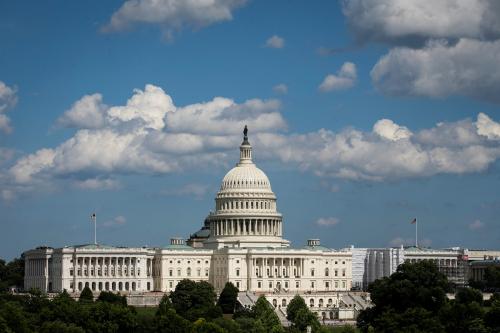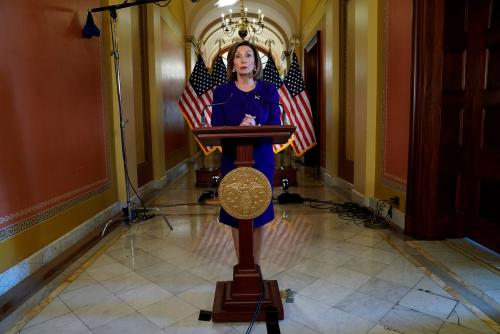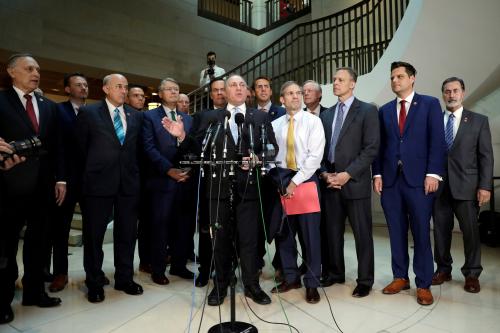This week the legal and constitutional momentum for Donald Trump’s impeachment accelerated while the political momentum stalled.
The most important event on the legal side was the testimony of William Taylor, former U.S. ambassador to the Ukraine, who returned to head the embassy in Kiev in 2019 after the abrupt dismissal of Ambassador Marie Yovanovitch. In over nine hours of testimony, Taylor revealed a parallel foreign policy being run by the president’s lawyer, Rudi Giuliani, phone calls between President Trump and Ukrainian President Volodymyr Zelensky that were hidden from other parts of the U.S. government, and the existence of a quid pro quo of military aid in return for investigations into Trump’s political opponent.
From the beginning, the president and his supporters insisted that the call was innocent and that there was no quid pro quo. Yet, the conclusions of those who heard the testimony were immediate and firm: There was. In addition, Taylor’s testimony contradicted a key point in the president’s defense–that there could be no quid pro quo because the Ukrainians didn’t know that the aid was held up. According to Taylor, and verified independently, senior-level Ukrainian officials knew this arrangement by the first week of August, and they also knew that the holdup was not a bureaucratic snafu. House investigators have now subpoenaed the Defense Department and the Office of Management and Budget for records related to the assistance freeze.
But while the legal momentum against the president grew stronger, the political momentum did not. In early October, most polls showed an increase in support for impeaching and removing the president. But those same polls show that most of the movement for impeachment and removal occurred among once-skeptical Democrats, while Republicans held firm against it. The Republicans, unable to keep up with the pace of investigations and unsure of what they will uncover, have a strategy of trying to denigrate the process. The week culminated with a group of Republican congressmen, in an effort to illustrate their point that the whole process was a sham, barging into the secure room at the Capitol where the House Intelligence Committee was hearing from a witness. The fact that Republican members of the Intelligence Committee were also in the room, and that not all members of Congress sit on all committees, was conveniently overlooked in order to make a point for television cameras.
As if on cue, the president’s lawyers argued in a Manhattan courtroom that Trump could literally shoot someone in the middle of Fifth Avenue and he still could not be punished while in office.
With attacks on the legitimacy of the impeachment process beginning to match the dizzying pace of investigations, the question is: Will anything affect Trump’s support among Republicans? There are still a few possibilities that might do just that:
- John Bolton turns out to be the John Dean of the Trump impeachment. Bolton was fired (apparently before he resigned) on Sept. 10, 2019. Thus, he was on the job when the infamous Ukraine phone call took place. And Fiona Hill, the former Russia expert at the National Security Council, testified that Bolton told her, “I am not part of whatever drug deal Sondland and Mulvaney are cooking up,” and then told her to let the White House lawyers know what was going on. Bolton could turn out to be an older version of the young attorney named John Dean who blew open the Watergate scandal that led to Richard Nixon’s resignation just short of impeachment and conviction.
- Lindsey Graham (R-S.C.) can’t take any more abuse and abandons Trump. Graham is well known for his about face on Trump, whom he called a “kook,” “crazy” and “unfit for office” during the 2016 campaign. He has been highly critical of Trump’s abrupt pull out from northern Syria, on which he was not even consulted. But by this week, he was back on the Trump bandwagon, introducing a Senate resolution condemning the House impeachment inquiry. In exchange for his current fawning posture, Graham could expect to be consulted—at the very least. How much more abuse will he take?
- Trump’s financial records reveal that he is not who he says he is. If the investigations in Washington and in the Southern District of New York reveal that something is amiss with Trump’s finances—perhaps he’s not as rich as he says he is, or that he’s bankrolled by the Russians—he could suffer the loss of some Republicans who bet on him as a wise businessman who could straighten out the country.
For now, public support for impeachment and removal is stuck in a holding pattern. History, however, tells us that if opinion changes, it could change fast. In the early 1950s, Sen. Joe McCarthy (R-Wis.) terrorized Washington, ruining lives and reputations in a hunt for communists hidden in the government. From 1950 to 1954 his investigations, often based on lies and innuendo, intimidated and bullied his fellow Republicans into silence—including the very popular Republican president, Dwight D. Eisenhower. But in April of 1954, the televised Army-McCarthy hearings began and the dam broke. Public approval of McCarthy dropped from 46% favorable to 34% favorable in just four months. Republicans soon abandoned their fellow lawmaker. By December of that year, the Senate voted to censure McCarthy, and McCarthyism was over.
If anything happens to change the public opinion on Trump, history shows that it could happen very quickly.
This work is licensed under the Creative Commons Attribution-NonCommerical-NoDerivatives 4.0 International License. To view a copy of the license, visit https://creativecommons.org/licenses/by-nc-nd/4.0/.
The Brookings Institution is committed to quality, independence, and impact.
We are supported by a diverse array of funders. In line with our values and policies, each Brookings publication represents the sole views of its author(s).








Commentary
Can anything move public opinion on impeachment and removal? This week in impeachment
October 25, 2019